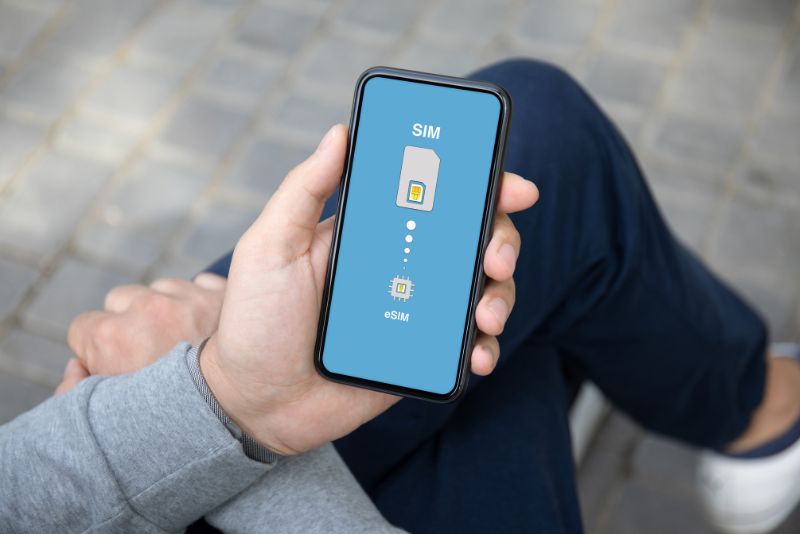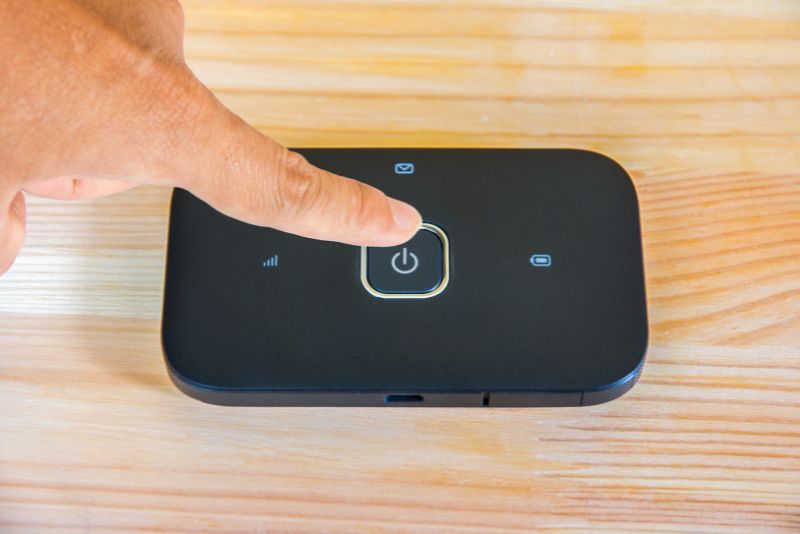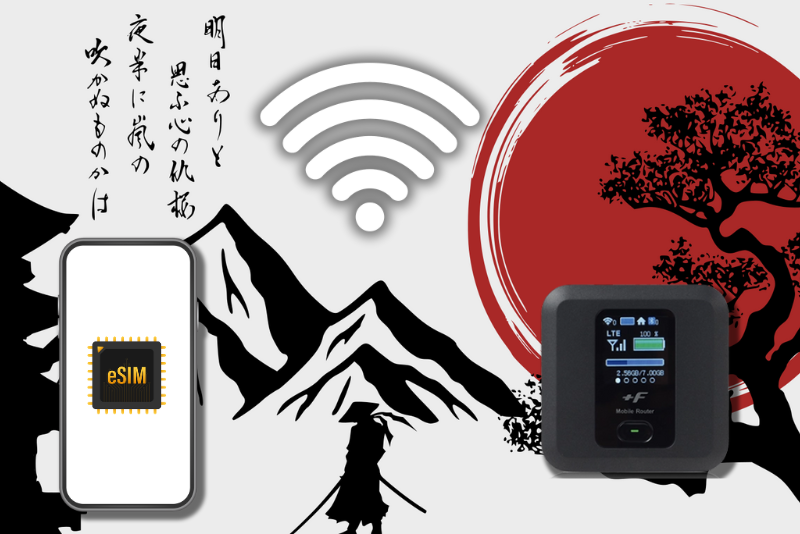You know you need Internet on your trip to Japan, but you aren’t sure what to get.

Traveling in Japan without the Internet is not a good idea. The Internet is indispensable in a country where English isn’t the primary language. It’s essential for navigation, dealing with public transport, or even calling for help.
The Internet also keeps you connected to family and friends and lets you share your experiences on social media.
But how should you access the Internet in Japan? Which is better, an eSIM or Pocket Wifi?
In this guide, we will compare eSIM vs Pocket Wifi Japan to help you make an informed decision for your trip to Japan.
Internet in Japan – Your Options
Japan is well-known for its high data speeds and advanced telecommunications technology. For travelers, this means you have several options to stay connected. The most popular choices are:
- eSIM
- Pocket WiFi
- Physical Sim Cards
- Free Mobile Hotspots
What is an eSIM

A SIM card lets you connect with a mobile network and access the Internet on your device. An eSIM or Embedded SIM is a virtual SIM card built into your device. It allows you to connect to a mobile network without needing a physical SIM card. eSIMs work on devices that support this technology, such as iPhones, Google Pixel phones, and specific models of Samsung and Huawei smartphones.
Top 5 eSIM Providers for Japan
- Holafly: Offers unlimited data plans with easy setup.
- Airalo: Provides flexible data packages tailored to short or long stays.
- Nomad: Known for competitive pricing and reliable coverage.
- Ubigi: Offers a wide range of data options with instant activation.
- Truphone: Excellent for travelers needing both data and voice services.
eSim Pros
- Easy to set up and activate
- No need for a physical SIM card
- Can switch between different data plans easily
- Convenient for multiple devices with eSIM support
eSim Cons
- Limited device compatibility
- It may not work in all areas of Japan, especially remote or rural areas
- Higher initial cost compared to other options
eSim Japan Tips
- Make sure your device supports eSIM technology before traveling to Japan.
- Check different providers’ coverage and data plans to find the best fit for your needs.
- Activate your eSIM before the plane lands to avoid any potential connectivity issues.
- Consider purchasing a local SIM card as a backup in case of any eSIM malfunctions.
- Keep your eSIM details and QR code in a safe place to avoid losing them.
Pocket WiFi

A pocket Wi-Fi device is a portable router that provides a private WiFi network. You can connect multiple devices at once to the router and then access the Internet through the mobile phone network.
Top 5 Pocket WiFi Providers in Japan
- Mobal: Offers unlimited data plans with a fast communication speed and comprehensive coverage.
- Japan Wireless: Offers a variety of plans with reliable nationwide coverage.
- Ninja WiFi: Known for high-speed connections and excellent customer service.
- Sakura Mobile: Provides flexible plans with options for short-term and long-term rentals.
- Wi-Fi Rental Store: Offers affordable data plans and convenient pickup locations.
Pocket WiFi Japan Pros
The pros of pocket Wi-Fi are:
- Shareable internet connection: Several devices can connect to the same router and access the Internet simultaneously.
- Portability: The small size of pocket Wi-Fi routers makes them easy to carry around and use on the go.
- Cost-effective: Some providers offer unlimited data plans, making them cost-effective for heavy internet users. Plus, you can avoid expensive international roaming charges.
Pocket WiFi Japan Cons
The cons of pocket Wi-Fi are:
- Limited battery life: A pocket WiFi device typically has a limited battery life and must be charged regularly.
- Additional device to carry: Carrying a separate router may not be convenient for some travelers, especially if they already have multiple devices to keep track of.
- Limited coverage in remote areas: Depending on the provider, pocket Wi-Fi may not have coverage in remote or rural areas.
Tips for Using Pocket WiFi in Japan
- Choose the right plan: Consider your data usage and choose a plan that fits your needs to avoid overpaying for unused data.
- Keep it charged: Be sure to carry a portable charger or plug in your router when not in use to ensure it has enough battery life for when needed.
- Check the coverage area: If you plan on traveling to remote areas, research the coverage of your pocket WiFi provider beforehand to avoid any connectivity issues.
- Rent from a reputable provider: To ensure quality service and reliable equipment, rent from a reputable provider such as Sakura Mobile or Wi-Fi Rental Store.
eSIM vs Pocket WiFi Japan – Which Should You Choose?
In recent years, eSIM has emerged as an alternative to traditional pocket WiFi for international travelers. But, eSIM vs pocket wifi Japan, which one is better?
eSIM – Solo Tech Savvy Travelers
An eSIM is the best choice if you travel alone or prefer a seamless, digital solution. It eliminates the need to carry an extra device and worry about charging it. Plus, activating and managing your data plan is straightforward through provider apps or websites.
- Frequent business travelers: For those constantly moving, an eSIM simplifies staying connected across different countries without juggling a SIM card.
- Minimalists: Users who prefer to travel light without the burden of additional gadgets find eSIMs appealing due to their no-physical-device nature.
- Tech enthusiasts: Individuals who enjoy using the latest technology trends appreciate the convenience and innovation behind eSIM technology.
- Environmentally conscious travelers: Those mindful of their environmental impact prefer eSIMs as they reduce the need for physical SIM cards and packaging.
Pocket Wifi – Larger Groups & Heavy Data Users
Pocket WiFi might be your go-to option if you’re traveling with family or friends and want a simple way for everyone to stay connected. It’s also ideal if you anticipate using a lot of data, as these devices often come with high or unlimited data caps.
- Families on vacation: Sharing a single data connection makes it easy for everyone.
- Groups of friends exploring new territories: A pocket WiFi allows friends to access Google Maps, look up attractions, and post social media updates collectively, ensuring nobody gets left out.
- Remote workers and digital nomads: For those who rely on stable Internet to work from different locations, pocket WiFi offers a dependable connection that can support multiple devices simultaneously.
- Content creators and influencers: High data usage for uploading photos and videos on the go makes pocket WiFi the preferable choice for those engaged in media production during their travels.
When choosing an eSIM vs Pocket WiFi Japan, consider how you plan to use the device, the number of people, and the amount of data you need.
Conclusion
eSIMs and Pocket WiFis offer reliable and convenient ways to stay connected while exploring Japan. Your choice ultimately depends on your travel style, device compatibility, and whether you travel solo or with others. Regardless of your option, you’ll have the internet access you need to make the most of your Japanese adventure.
FAQ
Can I use my phone’s hotspot instead of renting a Pocket WiFi?
If you opt for an eSIM with sufficient data, you can use your phone’s hotspot feature to share the Internet with other devices. However, keep in mind this can drain your phone’s battery quickly.
Is it easy to find public WiFi in Japan?
Japan has an extensive network of public WiFi spots, especially in urban areas and at tourist attractions. However, having your own eSIM or Pocket WiFi is advisable for a seamless and secure connection.
What happens if I run out of data on my eSIM?
You can purchase additional data through the eSIM provider’s app or website. Some providers offer top-up options directly from your device.
Can Pocket WiFi devices be delivered to my hotel in Japan?
Yes, many Pocket WiFi rental companies offer delivery services to hotels, airports, or residential addresses in Japan, making it convenient to start using the device as soon as you arrive.
Should I use a VPN in Japan?
Using a VPN in Japan is recommended when connecting to public networks. It can provide an extra layer of security and protect your sensitive information from potential hackers.
Hi, welcome to Events Hakuba. I started this site about eight years ago with a friend (who’s since moved away) to help travelers get more out of their time in Hakuba. What began as an event calendar has grown into a resource for everything from logistics to local insights.
It’s a one-person operation, and while I do my best to keep things current, it’s not a full-time gig—so thanks for your patience if anything’s slightly out of date.
If you’re curious about my main work, I run The Fifth Business — helping independent hotels scale guest revenue, retention, and operations without adding complexity.








